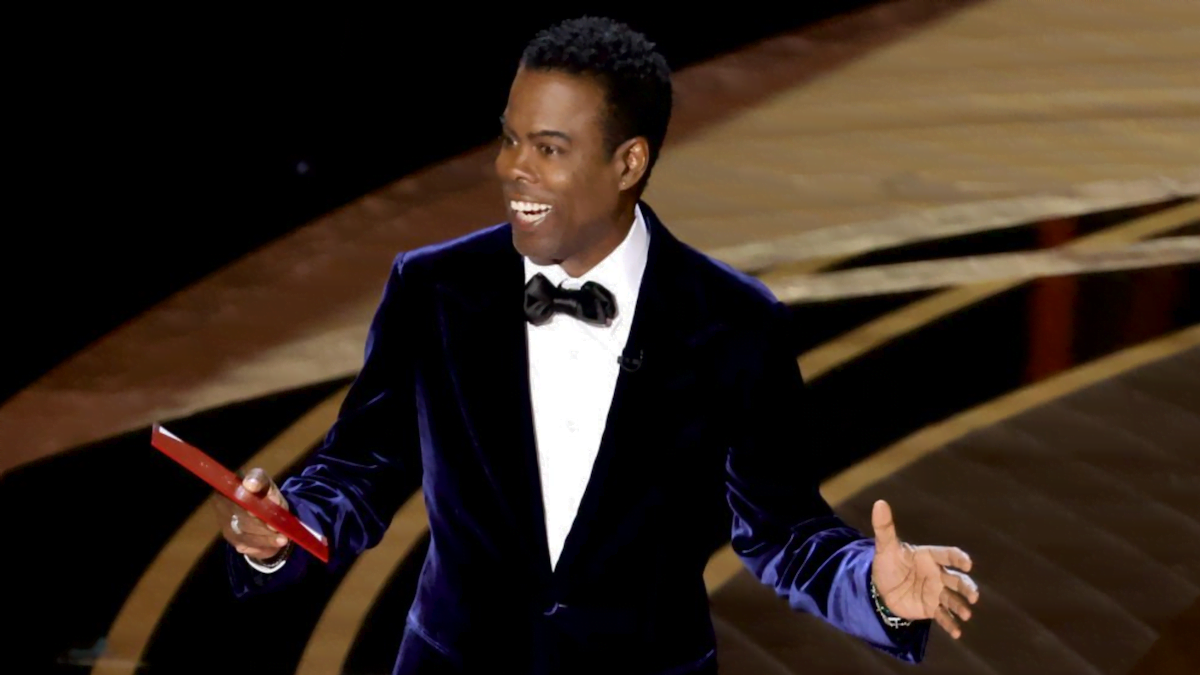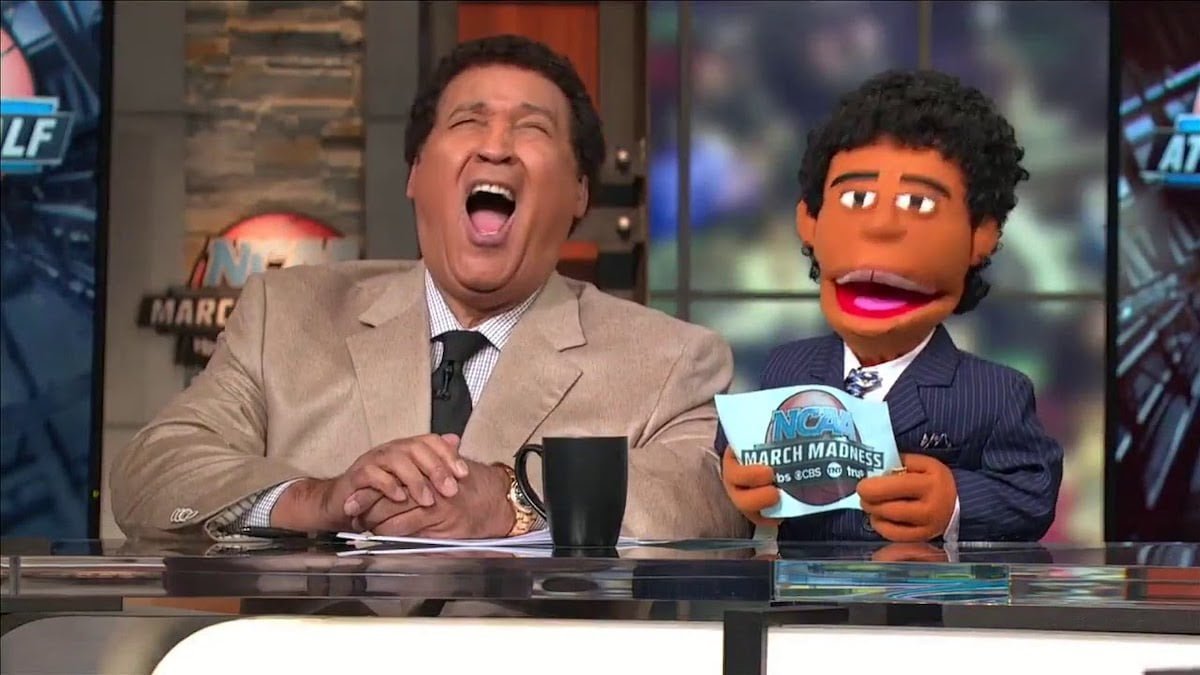Everyone has a plan until they get smacked in the mouth, and judging from what happened at the Oscars this past Sunday, you better have a plan for when you get smacked in the mouth, too.
I’m kidding.
Kind of.
Physical violence is not a professional hazard in sports broadcasting. However, people do occasionally lose their temper on-air whether it’s a co-host or a guest, which is why there is something to be learned from how Chris Rock reacted when Will Smith lost it. Rock’s relative composure is perhaps the only underappreciated point about the whole deal. It’s also the reason that — in the five days since the initial incident — the entire dialogue has been about what Smith did, why he was allowed to remain at the ceremony and how he should be punished.
As for Rock? There were some who felt that his joke was inappropriate, mocking a medical condition, but that part of the discourse didn’t last more than 24 hours before everyone pretty much settled on the fact that Rock’s joke, even if it was uncomfortable or uncalled for, certainly didn’t warrant Smith storming the stage, striking Rock and then returning to his seat where he yelled, profanely, twice.
I’m convinced that the reason Rock has not been further ensnared in the fallout is because of how he reacted. I’m not talking about his physical reaction, either, though that was impressive, too. As Mike Silver, the longtime NFL reporter Tweeted, Rock can take a punch better than Smith can take a joke.
Rock did not strike back at Smith. He did not cuss out Smith. He did not at all antagonize Smith, and because of that, the mess at the Oscars has been ascribed exclusively to Smith. He’s the one who might be disciplined. He’s the one who will be the butt of the jokes. Rock will be telling jokes off this for years because he maintained a level of calm despite being struck in the face, and there’s a lesson here for anyone paying attention.
You can’t always control, let alone foresee, what is going to enrage someone you’re on the air with. When it happens, though, you can take two very specific steps to keep from being pulled into the spectacle as an equal participant.
1) Don’t fight back.
This is admittedly difficult. When someone gets angry, they can get quiet and uncooperative or they can get aggressive and accusatory. In either instance, you’re making a mistake if you respond with anger or animosity. It will come off as mutual verbal combat.
As someone conducting an interview, it’s good to be firm, but you never want to be an aggressor even if you’re playing defense. Look at this exact transcript of what Chris Rock said after Will Smith struck him.
“Wow. Oh wow. Will Smith just smacked the shit out of me.”
Rock prepared to start another sentence and move on, but couldn’t get a single word out before Smith loudly suggested from his seat that Rock should not speak Jada Pinkett-Smith’s name again only he didn’t say it that nicely.
“Wow, dude,” Rock said. “It was a G.I. Jane joke.”
Smith repeated his instruction.
“I’m going to,” Rock said. He then stammered, collected himself. “That was the greatest night in the history of television. OK.”
Rock then announced the winner for the Best Documentary.
Did Rock have a right to respond? Of course, he did. The guy was struck in the face while holding his hands behind his back. The fact that he didn’t, however, is what made him more of a bystander to Smith’s tantrum.
Now, I want to compare that to another interview where the guy who was asking the questions opted against the high road. Nick Suss of USA Today was part of a video-chat interview of Deion Sanders, Jackson State coach.
Suss: “Hey Deion, I was just wondering if you could …
Sanders: “Uh, uh, let’s back up a little bit. You don’t call Nick Saban ‘Nick’ don’t all me Deion.”
Suss: “I call Nick Saban ‘Nick.’ I call you Deion.”
Sanders: “No you don’t. No you don’t. No you don’t. That’s a lie. If you call Nick ‘Nick’ you know you’d get get cussed out on the spot so don’t do that. Treat me like Nick.”
Suss: “OK, Deion.”
At that point Sanders took off the headset and left the interview. Now, I think Sanders is 100 percent wrong to demand to be called coach. I won’t call a coach by anything other than their first name because they’re not my coach. I don’t report to them nor do they have a supervisory role of my work. I would absolutely refuse, under any circumstance, to refer to a football coach as “Coach” if they asked me to.
However, I think continuing to call Sanders by his first name was antagonistic and unnecessary and what would have otherwise been a situation in which Sanders looked self-important and ridiculous into a pissing match that ended the interview. It was great content for anyone else, but I think the reporter comes across looking every bit as petty as Sanders.
2) Don’t back down.
Don’t fight fire with fire, but don’t walk back your question or observation unless there’s a reason to.
When someone gets mad, it’s not your job to placate them. They’re grown-ups who should be able to manage their emotions on their own, and just because someone is bothered doesn’t mean you have to back down from what has caused their problem.
Chris Rock didn’t apologize for the joke he told. In fact, he pointed out that it was something pretty trivial to get that upset about. Gary Washburn, who covers the Celtics for the Boston Globe, was just as effective when Dennis Schroeder was bothered by a question earlier this year about whether he was feeling more comfortable. The exchange begins at about the 2:15 mark of this video.
Washburn: “Dennis, in Philly, you had one point, but the game before in Indiana you had 23. It seems like you’ve been up-and-down a little bit. Are you starting to feel comfortable? You had the COVID protocol, you had a lot of things happen this week, are you starting to feel a little bit of comfort in the offense?”
Schroeder: “You with us or you with Philly?”
Washburn: “No, I’m just asking.”
Schroeder: “You with Boston? You work for us?”
Washburn: “I cover the Celtics. I’m just asking if you’re feeling any more comfortable over the last couple games.”
Schroeder: “It’s just a stupid question.”
Washburn: “My fault. Are you feeling any more comfortable? How did you feel like you played today?”
Schroeder: “Not good enough for you, huh?”
Washburn: “No. I’m asking about the bounce back.”
Schroeder: “We won so that’s all that matters. I’m a team player, so end of the day, if I’ve got 40 points or one point and win the game, I’m going to be happy with it. So, end of the day, I’m a team player, trying to win some games. And in Philly, we didn’t come out right, we played right, and that’s it.”
Washburn didn’t apologize. He didn’t back down from his question. He didn’t get angry with Schroeder, but he didn’t let him off the hook, either. The result was that Schroeder came across like someone who can’t take even mild criticism. Washburn looked like somebody doing his job, which is pretty much how everyone sees Chris Rock after what happened to him on Sunday at the Oscars. There’s a lesson we can learn from that about how to react when someone gets mad at you in public.
Danny O’Neil is a sports media columnist for BSM. He has previously hosted morning and afternoon drive for 710 ESPN Seattle, and served as a reporter for the Seattle Times. He can be reached on Twitter @DannyOneil or by email at Danny@DannyOneil.com.







